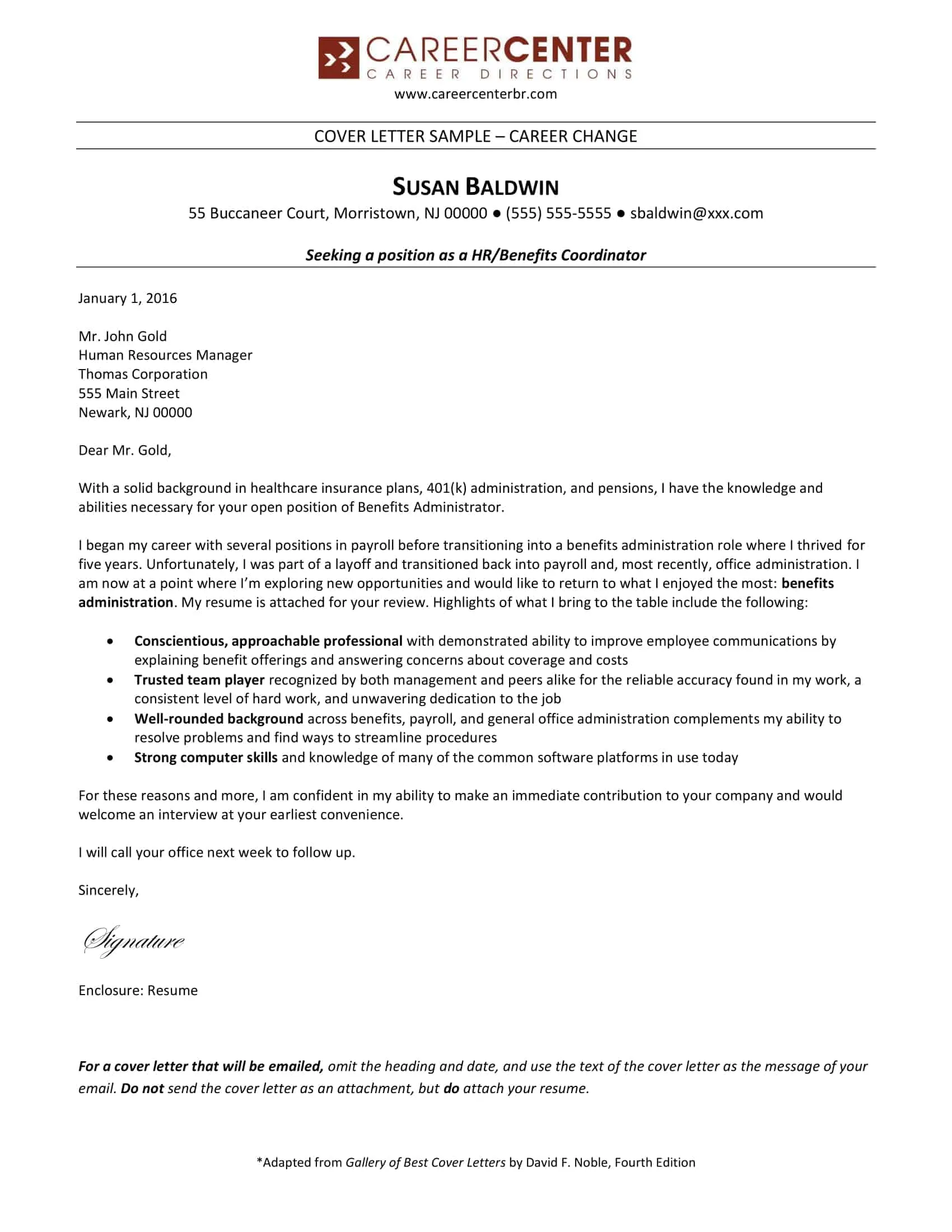Why You Need an Industry Change Cover Letter
Transitioning to a new industry is a significant career move, and a well-crafted cover letter is your key to unlocking opportunities. Unlike a standard cover letter, an industry change cover letter specifically addresses the elephant in the room your career shift. It serves as a powerful tool to persuade potential employers that your skills and experience, though perhaps gained in a different field, are highly relevant and valuable to their organization. It allows you to proactively manage the narrative surrounding your career change, alleviating any concerns the hiring manager might have about your suitability for the role. Without a dedicated industry change cover letter, you risk your application being overlooked due to a perceived lack of experience or understanding of the target industry. This is your chance to shine, to demonstrate adaptability, and to present yourself as a candidate eager and capable of making a successful transition.
Understanding the Purpose of Your Cover Letter
The primary purpose of your industry change cover letter is not just to introduce yourself, but to bridge the gap between your past experience and the requirements of your desired role. It should explicitly address the industry change, explain your motivation for the shift, and clearly illustrate how your skills, knowledge, and achievements align with the needs of the new industry. This is where you showcase your understanding of the target industry, demonstrating your commitment to learning and adapting. This letter is also where you can show you’re not just looking for a job, but are passionate about the new industry and the specific role. It’s an opportunity to show your enthusiasm, to convince the hiring manager that your unique background brings a fresh perspective and valuable assets to the team. Remember, the cover letter humanizes your application, giving you a chance to connect with the reader on a personal level and leave a lasting impression.
Highlighting Transferable Skills
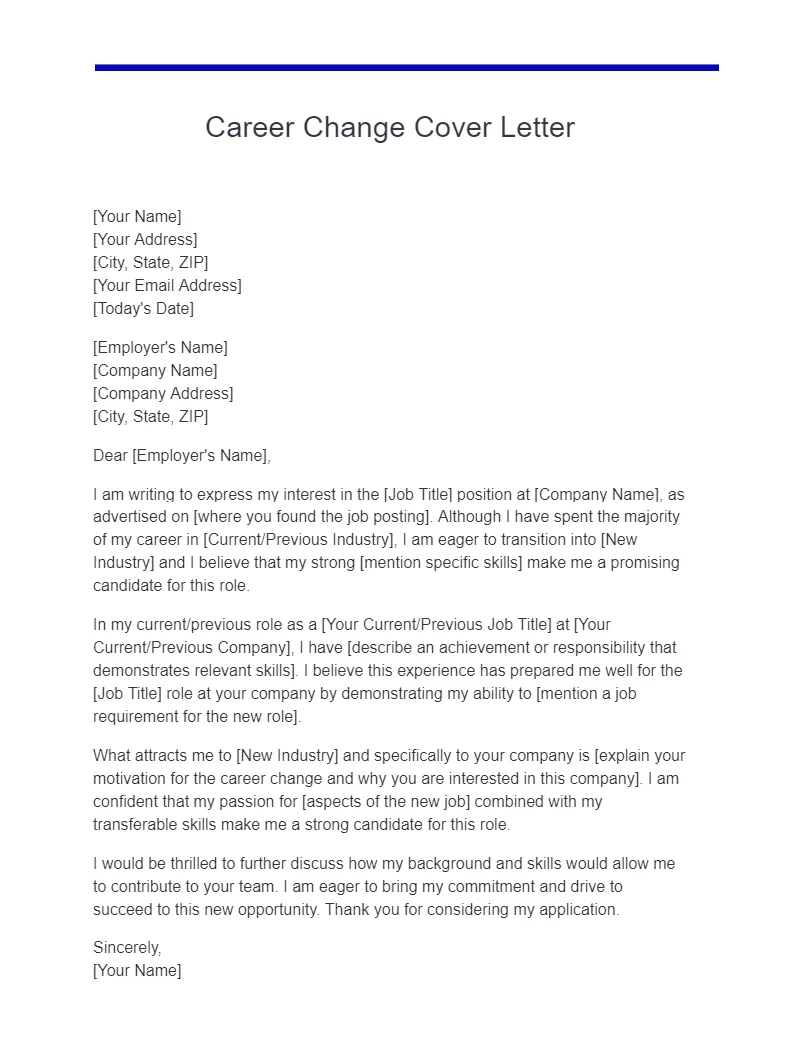
One of the most crucial steps in writing an effective industry change cover letter is to identify and highlight your transferable skills. These are the skills you’ve honed in your previous roles that are valuable and applicable in your new target industry. Transferable skills encompass a wide range, including communication, problem-solving, leadership, project management, and technical abilities. Begin by carefully reviewing the job description and identifying the skills and qualifications the employer is seeking. Then, reflect on your past experiences and pinpoint instances where you’ve demonstrated these skills. It’s not enough to list these skills; you must provide concrete examples, illustrating how you’ve applied them to achieve specific results. This will help the hiring manager understand how you’ll contribute to their team. This section serves as a bridge, connecting your previous work to the new industry.
Identifying Relevant Skills for the New Industry
Beyond highlighting transferable skills, you must also pinpoint the skills specific to the industry you’re aiming for. Research the industry thoroughly and identify the technical skills, soft skills, and knowledge required for the roles you’re targeting. Determine which of these skills you already possess, and which ones you are in the process of acquiring. If you’re undertaking any training or certifications, mention them explicitly to showcase your commitment to professional development. If you lack some of these required skills, you should address this proactively in your cover letter by acknowledging your learning plan. By proactively showing your awareness of the required skills, you’ll highlight your preparedness to contribute to your new role and industry.
Showcasing Accomplishments
Focusing on accomplishments is a powerful way to demonstrate your capabilities and value to a prospective employer. Instead of simply listing your job responsibilities, describe your achievements and the positive outcomes you generated in your previous roles. Quantify your results whenever possible. Did you increase sales, improve efficiency, or reduce costs? Provide specific numbers and data to illustrate your impact. By focusing on what you’ve achieved, you paint a clear picture of your ability to excel in the target industry. The STAR method (Situation, Task, Action, Result) can be a useful framework for showcasing your accomplishments. By using the STAR method, you provide context, describe the challenges you faced, outline the actions you took, and highlight the positive results you achieved. This method is an easy way to illustrate your impact and worth.
Quantifying Your Achievements
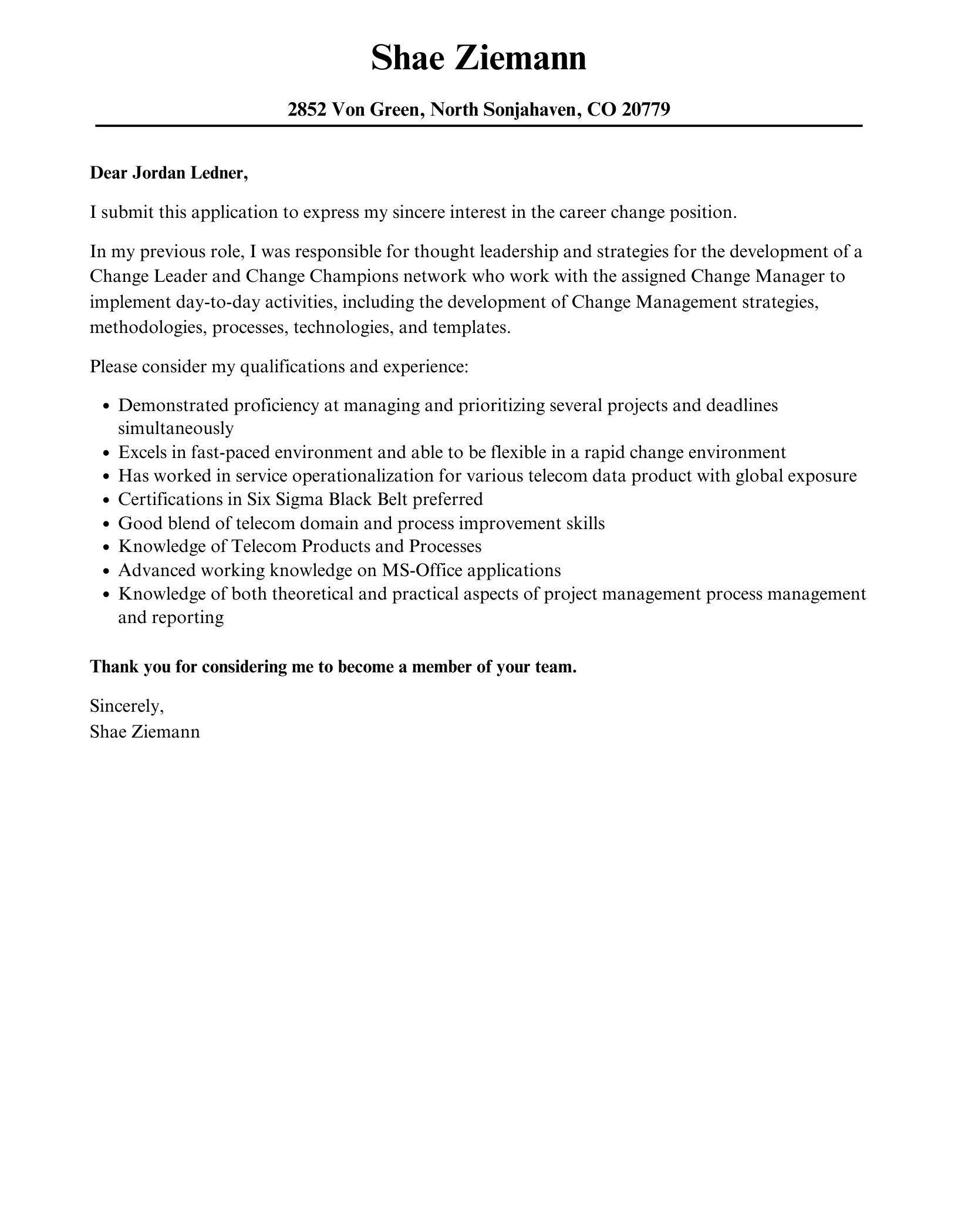
Quantifying your achievements adds credibility and impact to your cover letter. Whenever possible, use numbers, percentages, and specific metrics to illustrate your accomplishments. Instead of saying, “Improved customer satisfaction,” state, “Increased customer satisfaction scores by 15% in six months.” Instead of “Managed social media,” say, “Grew social media followers by 30% and increased engagement by 20%.” By using concrete data, you provide compelling evidence of your abilities and make it easier for the hiring manager to understand the value you can bring to their organization. This also demonstrates your analytical skills and your ability to measure and track results. Remember to choose metrics that are relevant to the new industry and the specific role you are seeking.
Addressing the Industry Change Directly
Don’t shy away from the fact that you are seeking an industry change; instead, address it directly and confidently. Acknowledge your career transition in a concise and clear manner, then immediately transition into the positive aspects of the change. Explain your rationale behind the switch without making excuses. Highlight the reasons why you’re passionate about the new industry and the specific role you’re applying for. Briefly describe what motivated the shift, whether it was a new career path, your personal interests or goals. This section should reassure the hiring manager of your commitment and show that you have a clear understanding of why you’re applying for the role. This transparency will demonstrate your self-awareness and professionalism, which is critical when making an industry change.
Explaining Your Motivation for the Switch
A key component of your industry change cover letter is explaining why you’re transitioning. This is where you articulate your genuine interest in the new industry and the specific role you’re applying for. Your explanation should be authentic and compelling, reflecting your passion and commitment. Don’t simply state that you want a new job; instead, emphasize what excites you about this new industry. Did a project or experience spark your interest? Are you drawn to the company’s mission or values? Have you always been fascinated by the field? Also, connect your motivation to the company’s goals and how your skills and experience can contribute to their success. This ensures your interest is not just self-serving, but is rooted in your ability to help the organization reach its goals. Explain the reasons behind your aspirations and highlight how your unique background can bring a fresh perspective to the role.
Demonstrating Industry Knowledge
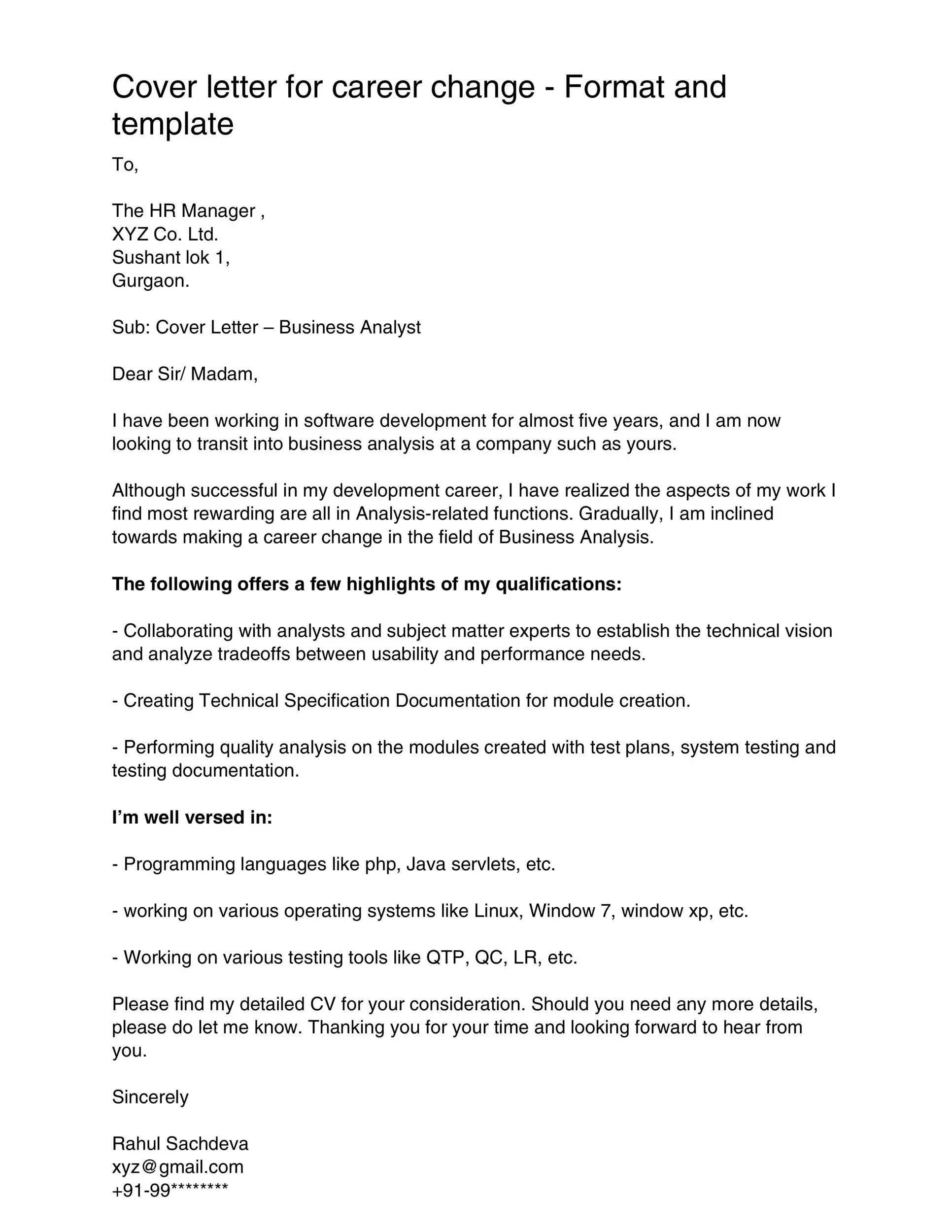
Demonstrating your knowledge of the target industry will alleviate any concerns the hiring manager might have. This includes showing your understanding of the industry’s trends, challenges, and key players. Mention any relevant publications, blogs, or industry events you follow. Refer to specific projects, products, or initiatives that resonate with you and align with the company’s work. Doing this research shows your genuine interest. If you’re familiar with the company’s work or any of their competitors, mention it briefly. Your goal is to show that you’ve done your homework and are committed to integrating into the industry, even if you don’t have direct experience. This diligence can demonstrate a keen interest in growth.
Researching the Target Industry
Thorough research is the cornerstone of a successful industry change cover letter. Before you begin writing, dedicate significant time to understanding the target industry, the companies within it, and the specific roles you’re interested in. Investigate industry trends, challenges, and opportunities. Explore company websites, read industry publications, and follow relevant blogs and social media accounts. Networking with professionals in the new industry is also a valuable resource. Use LinkedIn to connect with people, attend industry events, and learn from their experiences. This research will not only help you tailor your cover letter effectively, but will also provide you with the knowledge and insights needed to answer interview questions confidently. The more informed you are, the more persuasive your cover letter will be.
Tailoring Your Cover Letter
Generic cover letters are easily spotted and rarely make a lasting impression. To increase your chances of success, tailor your cover letter to each job application. Review the job description carefully, identify the key requirements and keywords, and customize your letter to address them directly. Highlight the skills, experience, and qualifications that align with the specific role and the company’s needs. Show how your background uniquely positions you to contribute to their success. Tailoring your cover letter demonstrates your genuine interest and commitment. It conveys that you’ve invested time in understanding the role and the company, and that you’re not just sending out a generic application. This level of personalization increases your chances of getting noticed and securing an interview. Remember to proofread and edit the letter to ensure it perfectly aligns with the job description.
Customizing for Each Application
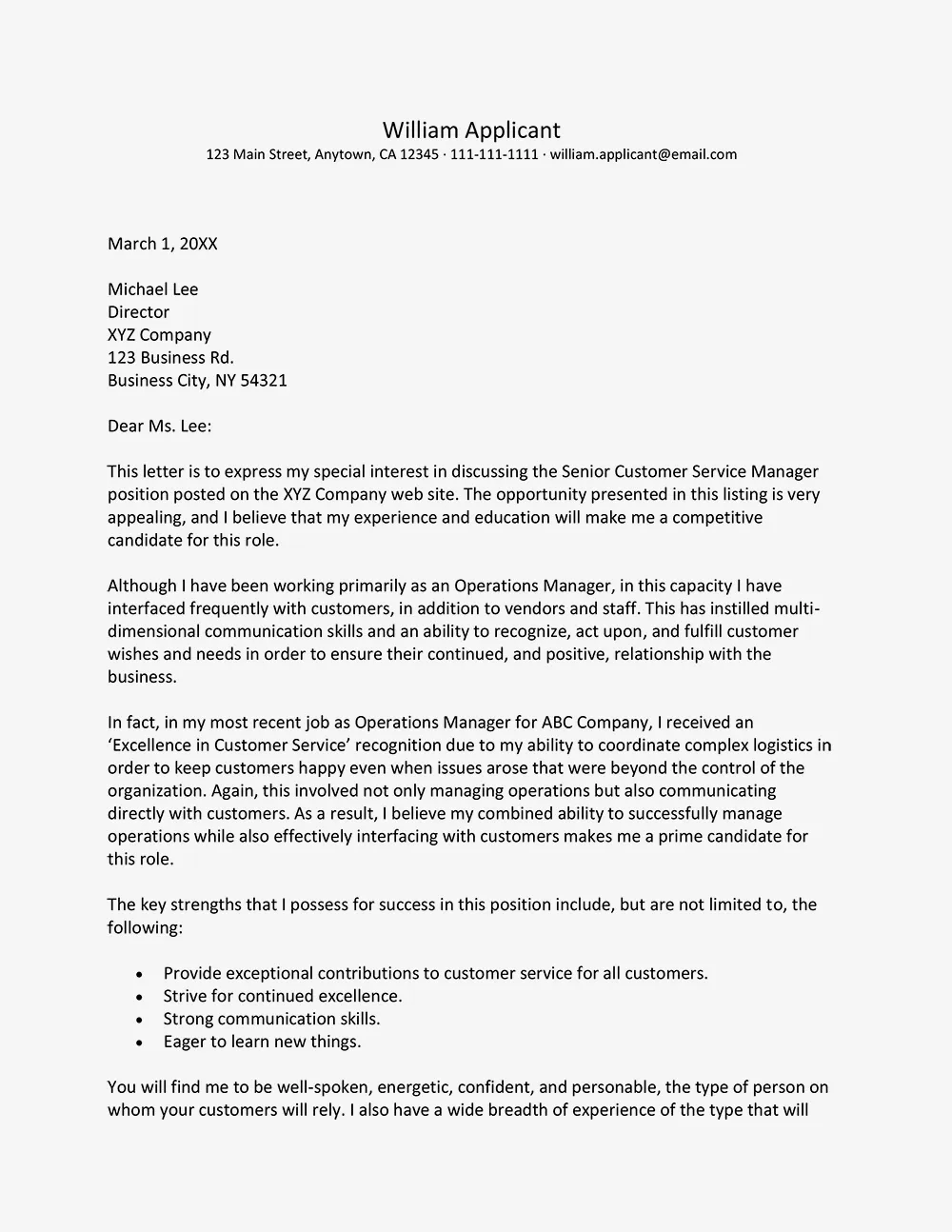
Every job and company is unique, which is why customizing your cover letter for each application is essential. Avoid using a one-size-fits-all approach. Instead, take the time to understand each job description, the company’s values, and their specific needs. Research the company’s culture, recent projects, and industry standing. Use this information to tailor your cover letter accordingly. Address the hiring manager by name if possible. Highlight the specific skills and experiences that match the job requirements. Explain why you’re interested in that particular company and how you can contribute to their goals. By showing that you understand their needs and that you’re genuinely interested in the opportunity, you increase your chances of making a positive impression and moving forward in the hiring process.
Formatting and Structure
The format and structure of your industry change cover letter are crucial for readability and impact. The letter should be well-organized, easy to read, and free of errors. Use a professional font, such as Times New Roman, Arial, or Calibri, and maintain consistent formatting throughout. Start with a clear and concise introduction, followed by the main body of the letter, which should address your transferable skills, achievements, and motivation for the industry change. Use concise paragraphs and bullet points to break up the text and make it more visually appealing. End with a strong closing paragraph, reiterating your interest in the role and expressing your enthusiasm. Proofread the letter carefully for any grammatical errors or typos. A well-formatted and structured cover letter shows professionalism and attention to detail, leaving a positive impression on the hiring manager.
Creating a Compelling Opening
Your opening paragraph sets the tone for your entire cover letter, so make it count. Instead of a generic greeting, immediately capture the reader’s attention by stating your purpose, expressing your enthusiasm, and briefly highlighting your key qualifications. If you have a contact who referred you, mention them in the first sentence. Explain why you’re excited about the role and the company. You can also consider a brief anecdote that showcases a relevant skill or accomplishment. The key is to make a strong first impression that encourages the hiring manager to read on. The opening should be clear, concise, and focused on the value you bring to the table. Your goal is to create interest and persuade the reader that you are worth their time.
Crafting a Strong Closing
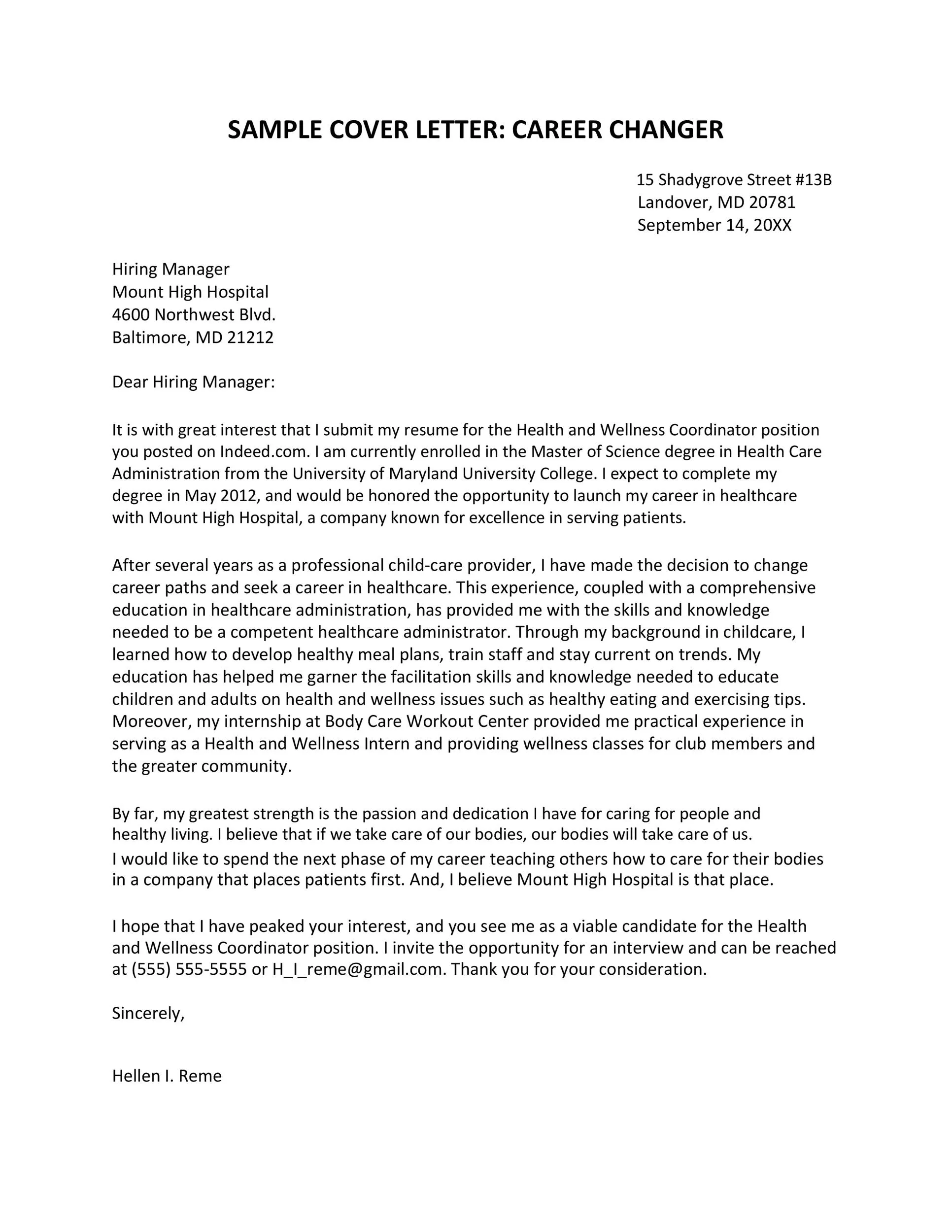
Your closing paragraph is your final opportunity to leave a lasting impression. Reiterate your interest in the role and the company, and express your enthusiasm for the opportunity. Summarize your key qualifications and highlight how you can contribute to their success. State that you’re eager to learn more about the position and discuss your application in more detail. End with a call to action, such as requesting an interview. Be sure to thank the hiring manager for their time and consideration. Avoid clichés and overly formal language. The closing paragraph should be confident, professional, and action-oriented, leaving the reader with a clear understanding of why you are the ideal candidate.
Proofreading and Editing
Before submitting your industry change cover letter, proofread and edit it meticulously. Even the smallest grammatical errors or typos can undermine your credibility and leave a negative impression. Read your letter several times, paying close attention to spelling, grammar, punctuation, and sentence structure. Ensure that your writing is clear, concise, and easy to understand. Use a spell checker and grammar checker, but don’t rely on them completely. Ask a friend, family member, or career counselor to review your letter for feedback. Look for any inconsistencies, awkward phrasing, or areas where you can improve clarity. Proofreading is a crucial step in the job application process. Your cover letter is a reflection of your professionalism, attention to detail, and communication skills, so make sure it’s polished and error-free.
Common Mistakes to Avoid
Avoid these common pitfalls when writing your industry change cover letter. Don’t be vague or generic; be specific and tailor your letter to each job. Steer clear of simply restating your resume; expand on your skills and accomplishments. Don’t focus solely on the industry change; emphasize what you can offer the new employer. Avoid negativity or making excuses for the career shift; instead, frame it positively. Don’t use jargon or technical terms unfamiliar to the target industry. Refrain from using clichés and generic phrases. Most importantly, don’t submit a cover letter full of errors. By avoiding these mistakes, you can create a compelling cover letter that showcases your value and increases your chances of landing your dream job in a new industry.
